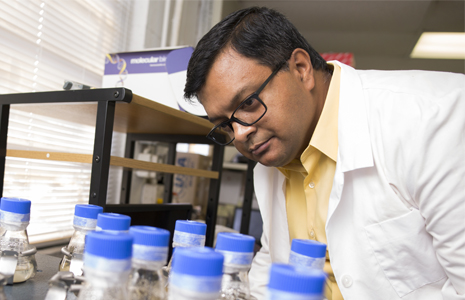Dr. Manjul Dutt
Assistant Professor - Horticultural Sciences
Program Emphasis – Citrus and Subtropical Fruit Breeding, Genetics.
Our research is primarily focused on citrus improvement using both conventional breeding tools and biotechnology.
Our breeding program is focused on the development of improved finger lime hybrids. Finger limes are putative HLB tolerant citrus that originated in Australia.
Finger limes contain round to teardrop-shaped vesicles that are firm and translucent. These vesicles tend to burst out of the fruit when it is cut and separate into individual “pearls” resembling caviar, giving the nickname citrus caviar. Conventional citrus on the other hand contains tender, teardrop-shaped juice sacs that adhere to each other.
We use conventional breeding methods as well as somatic cell fusion techniques to develop 2x, 3x and 4x populations of finger lime hybrids. Trees are being evaluated for tolerance to Huanglongbing (HLB) and we are trying to understand their tolerance mechanism using molecular tools. We are also evaluating the rootstock and nutritional requirements for finger lime cultivation under the central and south Florida conditions. Results from this research should help Florida growers assess the finger lime as a viable addition to their citrus portfolio. For more information on our finger lime projects please check out our finger lime page.
Citrus cell cultures and seedling derived epicotyl explants are being utilized for the genetic improvement of commercially important citrus cultivars. Novel engineered citrus lines are being produced for:
1. Disease management (primarily Huanglongbing and Citrus Canker)
Our disease management research is based on the premise that Systemic acquired resistance (SAR), can confer long-lasting protection against HLB. Several plant derived genes that play a role in the SAR process have been identified and incorporated into citrus to produce engineered plants.
2. Regulation of Flowering (Juvenility reduction)
The juvenile phase in citrus, where the plant remains in a vegetative state is usually long, ranging from 5-12 years, depending on the cultivar. Our research on this topic is focused on modulating genes in the flowering pathway and inducing early flower development under non-inductive conditions.
3. Biofortification (Increase in fruit anthocyanin content)
Anthocyanins are a very large group of red-blue plant pigments. Anthocyanins have several health promoting benefits and are naturally present in the blood orange. Commercial blood oranges cannot be grown in the citrus belt in Central and South Florida due to their inability to color up in the absence of appropriate cold conditions lacking in our subtropical climate. Anthocyanin biosynthesis in citrus is being regulated through the overexpression of R2R3-MYB transcription factor gene(s) to develop genetically engineered citrus.
- Program Members
- Publications
-
Education
- Ph.D. Horticulture, University of Florida.
- M.S. Plant and Soil Science, University of Kentucky.
- B.Sc. Agriculture, Orissa University of Agriculture and Technology, Bhubaneswar, India.
-
Professional Membership
- American Society for Horticultural Science
- American Pomological Society
- American Association for the Advancement of Science
- The Horticultural Society of India
- National Association of Plant Breeders

